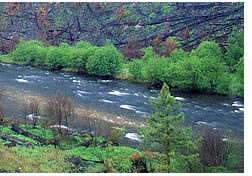contact
Michael Garrity, The Alliance for the Wild Rockies, (406) 459-5936
The Alliance for the Wild Rockies and the Ecology Center announced today that they have reached a settlement with the Forest Service on the proposed Rock Creek Timber Sale.
 Michael Garrity, Executive Director of the Alliance for the Wild Rockies said, “We are happy that our main concerns have been addressed, roadless areas will be protected, herbicides use will be restricted and less sediment will flow into Rock Creek.
Michael Garrity, Executive Director of the Alliance for the Wild Rockies said, “We are happy that our main concerns have been addressed, roadless areas will be protected, herbicides use will be restricted and less sediment will flow into Rock Creek.
“We would also like to thank Judge Ostby for working very hard in helping us reach this settlement,” said Garrity. U.S. Magistrate Judge Carolyn S. Ostby, held the settlement talks in Great Falls in May 18, 2004.
The Forest Service had originally proposed to log parts of Silver King, Welcome Creek, and Quigg Peak roadless lands. All roadless area logging as been dropped under the terms of the settlement.
“Forest Service studies have shown inventoried roadless areas provide clean drinking water and function as biological strongholds for populations of threatened and endangered species,” Garrity said.
Garrity believes, “Taxpayers will also benefit. The Lolo National Forest Environmental Assessment found that the Lolo National Forest would have lost $1,187,100 logging Rock Creek. The timber sale should now lose less money with the elimination of the roadless area logging.”
Settlement Agreement
- Harvest Units 3,5,9,28 and 29 will proceed as indicated in the Decision Notice with the exception that no commercial timber harvest will occur in these units. Only non-commercial treatments of trees 6 inches or less in diameter will be removed;
- Harvest unit 11 will be eliminated from the project;
- Weed treatments will follow Forest Plan Amendment 11 with the exception of Tordon, which will not be applied within 50 feet of open water;
- Road widening of 1/3 mile of Rock Creek Road 102 as described in the Decision Notice will not be implemented;
- Defendants will pay plaintiffs $5000 for fees. Each party will pay their own costs;
- The parties jointly move the court to dismiss the above -captioned cause of action with prejudice.